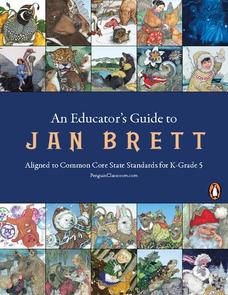Exploring Nature Educational Resources
Building A Classroom Food Web
From bears and owls to chipmunks and trees, all life depends on the sun for the energy to survive. Young biologists develop an understanding of this big idea as they arrange this series of plant and animal picture cards into food webs...
K12 Reader
Describe It with Adjectives
Put children's descriptive writing skills to the test with these fun collaborative writing activities. Presented with the picture of an object, young writers are are tasked with creating a description that provides enough detail for one...
K12 Reader
Identifying Adverbs IV
What a mess! Read about Lilly-Ann's birthday cupcake surprise and work on grammar skills at the same time. Four lengthy paragraphs provide kids with many opportunities to find and circle adverbs. They note the ways that adverbs come in...
K12 Reader
Identifying Adverbs III
Put young grammarians to the test with an activity about adverbs. A five-paragraph passage prompts kids to find the adverbs and circle them, noting their purpose in context.
K12 Reader
Identifying Adverbs II
Investigate the impact and function of adverbs with a grammar instructional activity. Kids look for the adverbs and adverbial phrases in 15 sentences, and then underline the verbs that the adverb modifies.
K12 Reader
Adverbs of Frequency II
Describe your daily activities with adverbs of frequency. Kids recall which things they seldom do, they rarely do, they frequently do, and the things that they never do.
K12 Reader
Working with Adverbs
Encourage critical thinking with a grammar exercise that focuses on adverbs and adverbial phrases. Kids read the first parts of 16 sentences, then decide which question to answer (how, how much, where, or when) based on the context, and...
K12 Reader
Identifying Adverbs
Work on adverbs and adverbial phrases with a grammar instructional activity. After reading 15 sentences with adverbs, learners circle the adverbs and adverbial phrases and note what question they are answering (when, how, where, and how...
K12 Reader
Adverbial Phrases
What is the purpose of adverbial phrases? Find out what questions adverbial phrases answer with a worksheet that focuses on grammar. As kids work through 16 sentences, they underline the phrases and use the space provided to mark what...
K12 Reader
Comparative Adverbs
Show the comparative forms of adverbs with a straightforward learning exercise. Learners decide how to represent 16 adverbs in both comparative and superlative forms.
K12 Reader
Adjectives to Adverbs
Create new adverbs with a list of adjectives. After reviewing how to add -ly to words that end in consonants, as well as words that end in vowels, kids work through 16 adjectives.
K12 Reader
Questioning Adverbs
How do adverbs enhance the meanings of verbs? Use a worksheet that prompts kids to identify what question adverbs are answering: when, where, or how.
K12 Reader
Adverbs of Frequency
How often do Peter and Sally go out dancing at night? How often do my cousin and I get in trouble at school? Help kids with adverbs of frequency with a straightforward grammar worksheet. They use the adverb in parentheses to rewrite the...
K12 Reader
Adjective to Adverb: Sentences
Could your young learners use some help with writing variety? Have them turn their adjectives into adverbs with a simple grammar exercise. Ten sentences prompt kids to find the adjective and rewrite the sentence to use an adverb instead.
K12 Reader
Eating with Adverbs
All the sentences on this adverb worksheet share a focus on eating—where, when, and how people are dining.
K12 Reader
An Adverb Can Tell Where
Outside, backwards, far. Adverbs that tell where action is happening is the focus of a colorful one-page worksheet that asks kids to select the appropriate adverb from the provided word bank.
K12 Reader
An Adverb Can Tell How
The -ly adverbs are the focus of a worksheet that asks kids to select adverbs from the provided word bank to add additional information about how the action of the sentence takes place.
K12 Reader
What Is an Adverb?
How, when, where, why. After a brief explanation of the types of additional information adverbs supply about verbs, kids circle the adverbs in a group of sentences and label the type of information provided.
K12 Reader
An Adverb Can Tell When
First, suddenly, always. Adverbs that provide additional information about when an action occurred are the focus of this one-page worksheet.
North Carolina Museum of Natural Sciences
Weather Watch Activity Guide: Groundhog Day
Exactly what do groundhogs know about weather? Not as much as your science students will after completing these lessons and activities that cover everything from the earth's rotation and the creation of shadows, to cloud...
Lunar and Planetary Institute
Oreo Moon Phases
Learning about the moon has never tasted delicious! Using the popular Oreo cookie as a model, young scientists carve out the cream filling to represent the different phases of the moon.
Penguin Books
An Educator's Guide to Jan Brett
Prepare to teach Jan Brett stories by taking a look at this teacher resource, which includes text-based questions, writing assignments, discussion ideas, and vocabulary practice for 18 different stories.
National Wildlife Federation
The Water Cycle
Observe the water cycle from the comfort of your classroom with this excellent earth science experiment. Working collaboratively, young scientists first create terrariums complete with hills, plants, lakes, and an atmosphere,...
Organic Farming
Four Seasons
Celebrate the changing of the seasons with this collection of arts and crafts activities.

























